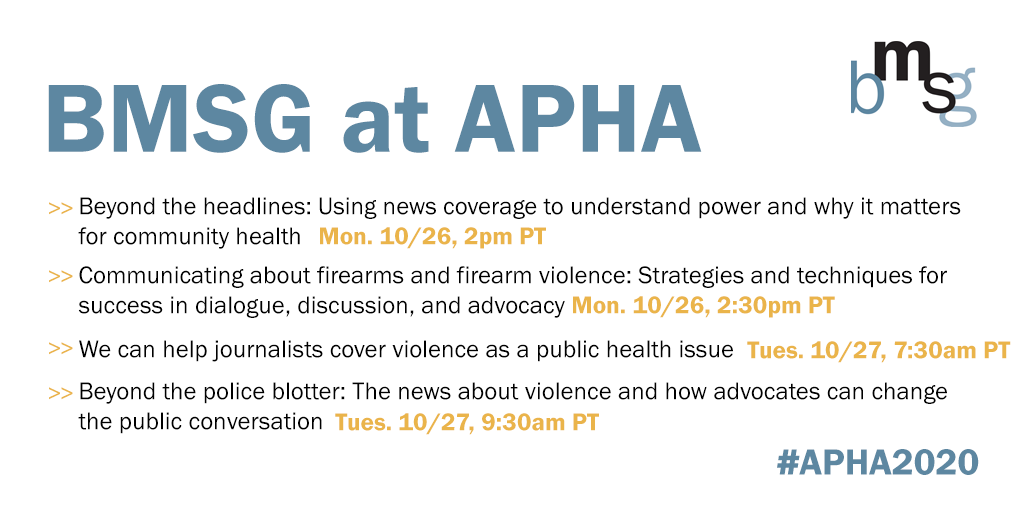Join BMSG at APHA 2020
by: Heather Gehlert
posted on Thursday, October 22, 2020
UPDATE: Footage of select APHA sessions are now available online to those who registered for the conference. For links to specific sessions / videos, see below.
The theme for this year’s meeting of the American Public Health Association — “Creating the Healthiest Nation: Preventing Violence” — is one that resonates deeply with us at BMSG. Twenty-seven years ago, BMSG got our start by working with The California Wellness Foundation’s Violence Prevention Initiative, a 10-year project with communities, researchers, and advocates that spanned 16 community collaboratives and led to hundreds of policies enacted and millions of dollars shifted toward prevention.
Since then, we’ve applied the lessons of violence prevention to many other public health issues, from affordable housing to childhood obesity. However, as violence continues to evolve and intersect with other issues, we remain committed to learning about it and acting to prevent it in all its forms.

Building on our previous analyses of gun violence and community violence in news coverage, the BMSG team will share insights at APHA from our latest research on these subjects. We will also discuss how journalists can improve their reporting on violence, and we’ll pull back the lens to look at the role of power — and narratives about power — in furthering efforts to strengthen racial and health equity and build safer communities.
Since APHA is virtual this year, we hope you’ll pull up your seat — and screen — and join us at our sessions, described below. You can also tweet with us by following @BMSG and using #APHA2020.
Beyond the headlines: Using news coverage to understand power and why it matters for community health
Monday, Oct. 26, 2 p.m. PT / 3 p.m. MT
Building community power to shape the conditions that affect health is important for advancing racial and health equity. To identify opportunities to elevate stories of power-building for health, our researchers evaluated how California news coverage reflects and transmits elements of power like inclusion, participation, and justice. In this session, we will share key findings from our analysis, discuss how social movements can shift coverage and help shift power, and review opportunities to engage reporters around making power visible in the news.
Communicating about firearms and firearm violence: Strategies and techniques for success in dialogue, discussion, and advocacy
Monday, Oct. 26, 2:30 p.m. PT / 3:30 p.m. MT
BMSG Head of Research Pamela Mejia will join this panel to discuss challenges and opportunities in communicating about firearm violence. It is important to understand the connotations of certain words, as some commonly used — and misused — terms may impact how the public and policymakers understand the issue and what to do about it. For example, with respect to suicide, which often is associated with stigma for the family and the person who dies by suicide, the terminology “committed suicide” is frequently used. Mejia and colleagues will discuss why using “died by suicide” can change the conversation and potentially decrease stigma. Audience participants will have the opportunity to ask questions about framing and language.
We can help journalists cover violence as a public health issue
Tuesday, Oct. 27, 7:30 a.m. PT / 8:30 a.m. MT
In this presentation, as part of the APHA featured session “Shaping the Narrative: The Media’s Influence on the Perception of Violence,” BMSG Director Lori Dorfman will discuss how the news media shape our country’s collective understanding of violence and how public health practitioners and advocates can work with journalists to bust myths and tell more accurate, thorough stories that include prevention. To view a video recording of this session, log in using your APHA credentials at https://apha.confex.com/apha/2020/meetingapp.cgi/Session/60916 (available until August 2021).
Beyond the police blotter: The news about violence and how advocates can change the public conversation
Tuesday, Oct. 27, 9:30 a.m. PT / 10:30 a.m. MT
Shifting the public narrative on violence – including, for example, who is deemed a legitimate spokesperson, and what solutions are considered credible — is a critical step toward prevention, and the news media are an especially important part of shaping our narratives on violence. In this presentation, part of the invited session “Communications for Culture Change: Communications Strategies That Create Space for New Approaches to Preventing Violence,” BMSG’s Pamela Mejia will review how patterns in news coverage of gun violence, domestic violence, and sexual harassment, abuse and assault can instill fear and discourage action toward change, as well as opportunities to reframe the public narrative to include prevention and counteract racist stereotypes. To view a video recording of this session, log in using your APHA credentials at https://apha.confex.com/apha/2020/meetingapp.cgi/Session/59949 (available until August 2021).
To learn more about BMSG’s work on violence and other public health issues, visit https://www.bmsg.org/our-projects/. To view our news analyses, reports, and other resources, visit https://www.bmsg.org/publications/.



